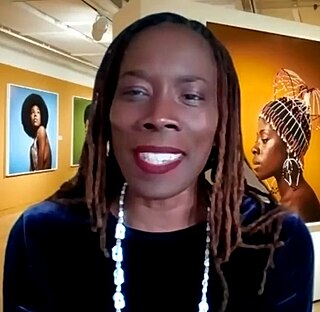Related Research Articles

Parenting or child rearing promotes and supports the physical,cognitive,social,emotional,and educational development from infancy to adulthood. Parenting refers to the intricacies of raising a child and not exclusively for a biological relationship.
Racial discrimination is any discrimination against any individual on the basis of their race,ancestry,ethnicity,and/or skin color and hair texture. Individuals can discriminate by refusing to do business with,socialize with,or share resources with people of a certain group. Governments can discriminate explicitly in law,for example through policies of racial segregation,disparate enforcement of laws,or disproportionate allocation of resources. Some jurisdictions have anti-discrimination laws which prohibit the government or individuals from being discriminated based on race in various circumstances. Some institutions and laws use affirmative action to attempt to overcome or compensate for the effects of racial discrimination. In some cases,this is simply enhanced recruitment of members of underrepresented groups;in other cases,there are firm racial quotas. Opponents of strong remedies like quotas characterize them as reverse discrimination,where members of a dominant or majority group are discriminated against.
Interracial adoption refers to the act of placing a child of one racial or ethnic group with adoptive parents of another racial or ethnic group.
Internalized racism is a form of internalized oppression,defined by sociologist Karen D. Pyke as the "internalization of racial oppression by the racially subordinated." In her study The Psychology of Racism, Robin Nicole Johnson emphasizes that internalized racism involves both "conscious and unconscious acceptance of a racial hierarchy in which a presumed superior race are consistently ranked above other races. These definitions encompass a wide range of instances,including,but not limited to,belief in negative stereotypes,adaptations to cultural standards,and thinking that supports the status quo.
William E. Cross Jr. is a theorist and researcher in the field of ethnic identity development,specifically Black identity development. He is best known for his nigrescence model,first detailed in a 1971 publication,and his book,Shades of Black,published in 1991. Cross's nigrescence model expanded upon the work of Black psychologists who came before him and created an important foundation for racial/ethnic identity psychology. It has proved a framework for both individual and collective social change. Throughout his career,Cross has been concerned with racial/ethnic identity theory and the negative effects of Western thought and science on the psychology of Black Americans,specifically the need for “psychological liberation under conditions of oppression.”
The University of Maryland School of Public Health is located in College Park,Maryland. U.S. News &World Report ranked the school 25th among all schools and programs of public health in 2024. Its departments include Behavioral and Community Health;Epidemiology and Biostatistics;Family Science;Health Policy and Management;and Kinesiology. It also includes the Maryland Institute for Applied Environmental Health;the Herschel S. Horowitz Center for Health Literacy;the Maryland Center for Health Equity;and the Prevention Research Center.
Minority stress describes high levels of stress faced by members of stigmatized minority groups. It may be caused by a number of factors,including poor social support and low socioeconomic status;well understood causes of minority stress are interpersonal prejudice and discrimination. Indeed,numerous scientific studies have shown that when minority individuals experience a high degree of prejudice,this can cause stress responses that accrue over time,eventually leading to poor mental and physical health. Minority stress theory summarizes these scientific studies to explain how difficult social situations lead to chronic stress and poor health among minority individuals.
Ethnic identity development includes the identity formation in an individual's self-categorization in,and psychological attachment to,(an) ethnic group(s). Ethnic identity is characterized as part of one's overarching self-concept and identification. It is distinct from the development of ethnic group identities.
Sandra L. Hofferth is a Professor in the Department of Family Science at the University of Maryland School of Public Health in the United States,and is Director of the Maternal and Child Health Bureau. She is the former co-director of the Michigan Panel Study of Income Dynamics and founding Director of its Child Development Supplement. Her research focuses on American children's use of time;poverty,food insecurity,public assistance,and child health and development;and fathers and fathering. Hofferth is the author of more than 100 articles and five books. She studies employment and parenting among women and most recently has extended this interest to men. Her current research focuses on the transition of young men to adulthood,and particularly disadvantaged young men. Her papers have examined the link between the timing of childbirth and relationship outcomes for young men,factors influencing the transition of young men into residential and nonresidential fatherhood,the consequences of children for young men's relationships,and how young men's and their partner's employment experiences affect their relationships with children.
Jeanne Brooks-Gunn is an American developmental psychologist and professor. She is currently the Virginia and Leonard Marx Professor of Child Development at Teachers College,Columbia University.
Velma McBride Murry is an American psychologist and sociologist,currently the Lois Autrey Betts Chair in Education and Human Development and Joe B. Wyatt Distinguished University Professor at Vanderbilt University. Her research has largely focused on resilience and protective factors for African-American families,and she has several publications in this area. In addition to her empirical research,she has contributed to several published books and used her experience to create two family-based preventative intervention programs.
Racial trauma,or race-based traumatic stress,is the cumulative effects of racism on an individual’s mental and physical health. It has been observed in numerous BIPOC communities and people of all ages,including young children. Racial trauma can be experienced vicariously or directly. It has been linked to feelings of anxiety,depression,and suicidal ideation,as well as other physical health issues.
Robert M. Sellers is the Charles D. Moody Collegiate Professor of Psychology and Education at University of Michigan who formerly served as the Vice Provost for Equity and Inclusion &Chief Diversity Officer. His research focuses on the importance of racial identity. Most specifically,Sellers focuses on the identity of African Americans,regarding a variety of domains,such as mental health and discrimination.
Racial-ethnic socialization describes the developmental processes by which children acquire the behaviors,perceptions,values,and attitudes of an ethnic group,and come to see themselves and others as members of the group.
Bertha Garrett Holliday is a community psychologist known for her expertise on ethnic minority issues. Her work has focused on processes of child and family socialization and the academic experiences and achievement of Black youth. Holliday was Senior Director of the Office of Ethnic Minority Affairs at the American Psychological Association (APA),where she led APA's efforts to increase scientific understanding of role of culture and ethnicity in human relationships and behavior. She retired from the Office of Ethnic Minority Affairs in 2010 after 16 years of service to the APA.

Kevin Cokley is an African-American counselling psychologist,academic and researcher. He is University Diversity and Social Transformation Professor,Associate Chair of Diversity Initiatives,Professor of Psychology at the University of Michigan Ann Arbor. Previously he was the Oscar and Anne Mauzy Regents Professor of Educational Research and Development,Department Chair of Educational Psychology,and Professor of African and African Diaspora Studies at the University of Texas at Austin,where he directed the Institute for Urban Policy Research &Analysis. He was a Fellow of the UT System Academy of Distinguished Teachers and a Distinguished Teaching Professor at the University of Texas at Austin.
Diane Leslie Hughes is a developmental psychologist known for her research on racial-ethnic socialization,parent-child communication about discrimination and racism,interracial relationships,and the influence of racial ecology on people's experiences in social settings. She is Professor of Applied Psychology at the Steinhardt School of Culture,Education,and Human Development and co-director of the Center for Research on Culture,Development,and Education at New York University.
Riana Elyse Anderson is an American clinical and community psychologist focused on racial discrimination and black families. Anderson is an assistant professor in the Department of Health Behavior and Health Education at the University of Michigan School of Public Health. She was trained in Clinical and Community Psychology at the University of Virginia,at Yale University School of Medicine,and at the University of Pennsylvania. Riana studies how racial discrimination impacts the mental health of Black adolescents and their families. She works with therapeutic programs and community partners and shares knowledge through media,writing,and talks. She has received numerous grants,awards,and fellowships in support of her work.
Chanequa Walker-Barnes is an American theologian and psychologist. Her research as a clinical psychologist has focused on African American health disparities,and as a womanist theologian she has written about the myth of the "StrongBlackWoman" and the need for the voices of women of color. She has written two books,Too Heavy a Yoke and I Bring the Voices of My People.

Thema Simone Bryant,also known as Thema Bryant-Davis,is an American psychologist who is a professor of psychology at the Pepperdine University,where she directs the Culture and Trauma Research Laboratory. Her research considers interpersonal trauma and societal trauma of oppression. She was elected as the 2023 President of the American Psychological Association.
References
- ↑ "Mia Smith-Bynum". sph.umd.edu. Retrieved 2020-10-20.
- ↑ "Mia Smith-Bynum, Ph.D. — Maryland Population Research Center". www.popcenter.umd.edu. Retrieved 2020-11-26.
- ↑ "Initiatives | SRCD Black Caucus" . Retrieved 2020-11-26.
- 1 2 3 4 "Mia Smith-Bynum CV" (PDF).
- ↑ "Dr. Mia Smith-Bynum Recognized with 2016 PCEMI Faculty Award | UMD School of Public Health". sph.umd.edu. Retrieved 2020-11-26.
- ↑ "SPH staff, faculty honored in Spring 2016 Assembly | UMD School of Public Health". sph.umd.edu. Retrieved 2020-11-26.
- ↑ "University of Virginia Gilmer Gazette" (PDF).
- 1 2 "Mia Smith Bynum".
- ↑ Families in Daily Life: Macro and Micro Perspectives. Cognella Academic Publishing. 2017. ISBN 978-1516557097.
- ↑ Smith-Bynum, Mia A. (1999). "Mother-daughter relationships and sexual outcomes in late-adolescents: A study of African American mothers and daughters". Doctoral Dissertation, University of Virginia.
- ↑ Smith-Bynum, Mia A.; Anderson, Riana E.; Davis, BreAnna L.; Franco, Marisa G.; English, Devin (2016). "Observed Racial Socialization and Maternal Positive Emotions in African American Mother-Adolescent Discussions About Racial Discrimination". Child Development. 87 (6): 1926–1939. doi:10.1111/cdev.12562. PMC 5121096 . PMID 27211821.
- ↑ Hart, John R.; Coates, Erica E.; Smith-Bynum, Mia A. (2019-10-02). "Parenting Style and Parent-Adolescent Relationship Quality in African American Mother-Adolescent Dyads". Parenting. 19 (4): 318–340. doi:10.1080/15295192.2019.1642085. ISSN 1529-5192. S2CID 210438460.
- ↑ "Black Families Research Group". spark.adobe.com. Retrieved 2020-10-22.
- ↑ Lambert, Sharon F.; Herman, Keith C.; Bynum, Mia Smith; Ialongo, Nicholas S. (2009). "Perceptions of Racism and Depressive Symptoms in African American Adolescents: The Role of Perceived Academic and Social Control". Journal of Youth and Adolescence. 38 (4): 519–531. doi:10.1007/s10964-009-9393-0. ISSN 0047-2891. PMC 2756408 . PMID 19636725.
- 1 2 Smith-Bynum, Mia A.; Burton, E. Thomaseo; Best, Candace (2007). "Racism experiences and psychological functioning in African American college freshmen: Is racial socialization a buffer?". Cultural Diversity and Ethnic Minority Psychology. 13 (1): 64–71. doi:10.1037/1099-9809.13.1.64. ISSN 1939-0106. PMID 17227178.
- ↑ White-Cummings, Chandra. "Perspective | We need more white parents to talk to their kids about race. Especially now". Washington Post. ISSN 0190-8286 . Retrieved 2020-12-01.
- ↑ Romm, Cari (2018-06-07). "The Psychological Effects of Being Separated From Your Child". The Cut. Retrieved 2020-12-01.